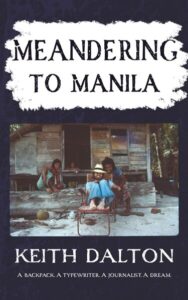Author and journalist Fatima Bhutto reflects on how caring for her pet dog shed light on her own relationships in this tender and insightful memoir of a doomed love affair.
Memoir

Keith Dalton was a journalist with foreign correspondent dreams. He had them as a 10-year-old. They never went away. Dalton was 25 when he crammed a typewriter in his backpack and set off from Australia to Southeast Asia, convinced he could be a self-made foreign correspondent. Writing as he went, Dalton took buses, trucks, trains, planes, passenger ferries, cargo ships, and canoes.
Kay Enokido was the longtime president of the stately Hays-Adams hotel in Washington, DC, hosting dignitaries like the Japanese monarchy and the Obama family before the president was sworn in. But before she was a hotelier, and before that a journalist, she had another, earlier story, one that provides the heart of her book, Phantom Paradise: Escape from Manchuria.
In 1981, Japanese actress and television personality Tetsuko Kuroyanagi published a best-selling memoir, Totto-chan: The Little Girl at the Window, an engaging story set during her unusual primary school years that happened to take place during World War II. Her book sold 4.5 million copies in Japan in just its first year and has been translated into thirty languages, eleven from India alone. The book tells of Kuroyanagi’s rambunctious childhood that got her expelled from her first school, partly because she refused to sit at her desk and instead wanted to look out the window at the sparrows outside.
Arundhati Roy’s much-awaited memoir, Mother Mary Comes To Me, tackles Roy’s writing career, India’s sweeping political instability, and most of all, a reckoning with an exhilarating character: her mother, Mary Roy. From Roy’s village, fictionalised even here as “Ayemenem”, to the chaotic urban sprawl of Delhi, the book covers Roy’s rocky childhood, her brief architectural foray, her sudden and dizzying literary stardom, and eventually, her settling into the role as one of India’s most beloved—and most widely politicised—writers.
Expat memoirs, even (or perhaps especially) of the East Asian variety, are a venerable genre. One suspects that even in the early days, what authors presented as new and exotic, probably wasn’t really. In these days of ubiquitous travel videos on YouTube, this is probably even more the case. As a result, such books need a good raconteur or prose stylist to pass muster. Fortunately, Connla Stokes is both.
Naguib Mahfouz (1911-2006) was an Egyptian novelist, short-story writer and screenwriter. He spent his entire life in Cairo, the setting for almost all his fiction. He is best known for The Cairo Trilogy— Palace Walk (1956), Palace of Desire (1957) and Sugar Street (1957)—which follows succeeding generations of a Cairene family, the Abd al-Jawads, from World War I until the Egyptian revolution of 1952. In 1988, Mahfouz became the first, and so far, the only, Arab writer to be awarded the Nobel Prize in Literature.
In 2019, famed journalist and writer Aatish Taseer was thrown out of India. Soon after he wrote a cover article for Time calling Prime Minister Narendra Modi the country’s “divider in chief”, New Delhi decided to revoke his residency.
Aatish Taseer, with roots in England, India, Pakistan, and the USA, appears to be a member of the globalized elite, able to call multiple nations his own. For Taseer, however, there is only one country he calls home. A self-described “Indian writer”, Taseer, for much of his adult life, has distanced himself from his absentee, Pakistani politician father. Still, despite Taseer’s best efforts, his father’s nationality has come back to haunt him.

Ma Thanegi’s roots are deeply planted in Myanmar. She’s the great-niece of a noble scoundrel who once ornamented the court of King Thibaw, her country’s last king, and the great-granddaughter of one of the last queen’s ladies-in-waiting. The daughter of a sophisticated, mercurial intellectual and the brilliant, tempestuous beauty who was his wife, Ma Thanegi has spent her life in Myanmar with the ambition of revealing its beauties and virtues to the rest of the world. She’s achieved her goal through her writing, with six books written in English and published internationally, but until now her own story has been told only in fragments.

You must be logged in to post a comment.